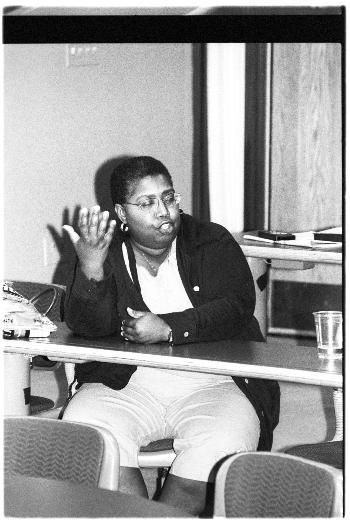
News
HMS Is Facing a Deficit. Under Trump, Some Fear It May Get Worse.

News
Cambridge Police Respond to Three Armed Robberies Over Holiday Weekend

News
What’s Next for Harvard’s Legacy of Slavery Initiative?

News
MassDOT Adds Unpopular Train Layover to Allston I-90 Project in Sudden Reversal

News
Denied Winter Campus Housing, International Students Scramble to Find Alternative Options
Crossley Discusses Civil Rights Documentary Work

Emmy Award winner Callie Crossley screened and discussed her civil rights documentary work as part of the Institute of Politics (IOP) Summer-in-Boston Program on Wednesday at the Kennedy School of Government.
Crossley, a former ABC News producer, is most notably known for her work on the “Eyes on the Prize” documentary, a six part PBS mini-series produced by Blackside Productions that chronicles the battle for Civil Rights in the South during the 1960s. Since it first debuted in 1988, the documentary has been viewed by over 20 million people.
Crossley opened her presentation on Wednesday with a screening of “Bridge to Freedom,” the sixth part of the mini-series which she directed and produced.
The film, which captivated Wednesday’s audience, documents the highly-charged events leading to the historic march from Selma to Montgomery, Alabama in 1965, using rare archival footage and recollections from march participants to illustrate the fragile coalition of southern religious leaders in the Civil Rights Movement.
The documentary also portrayed the violent struggle that many blacks in the South faced to gain such basic democratic rights as voting—with the violence inflicted leading to greater attention by national media and politicians to the hypocritical practices taking place in many southern states.
After the film, Crossley opened the floor to questions on both “Bridge to Feedom” and television news in general.
She cited the importance of the late Henry Hampton—owner and president of Blackside Inc., as well the executive producer of the mini-series—in creating the documentary, saying “wonderful divine intervention” and hard graft contributed to the immense success of the project.
When speaking on the importance of documentary film, Crossley noted the significance of archiving the “ordinary moments” of life.
But despite the comprehensiveness of the project, Crossley acknowledged that there “are many more stories to tell.”
When asked if any outstanding civil rights issues remain today, Crossley said there is still a lack of discussion of race issues in the U.S., despite efforts being made since the 1960s, most recently by the Clinton Administration.
“There is often no conversation about race…They don’t talk about it, they don’t know how to approach it, they just scream about it,” Crossley said. She added that problems with race are a “global issue” not just isolated to the U.S.
Crossley, who currently serves as a studio host for “Beat the Press” on WGBH-TV in Boston, spent a year as a Neiman fellow at Harvard in 1983, and was named an IOP fellow last February. During the spring semester, she led a study group on media perspectives and biases.
—Tristan Feunteun and Julian Lee
Want to keep up with breaking news? Subscribe to our email newsletter.
